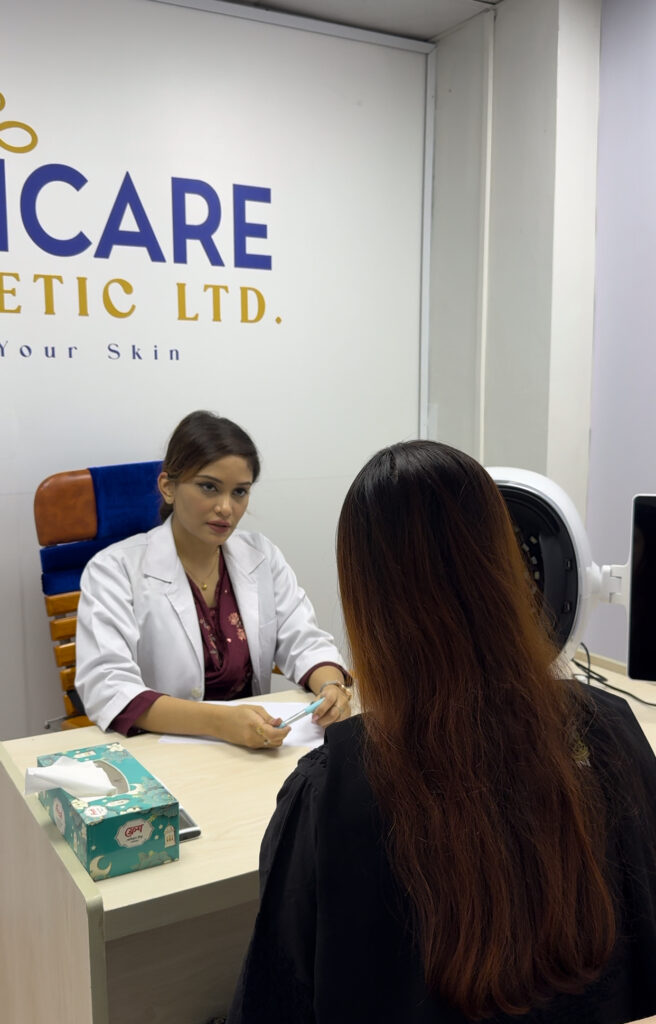Welcome to Femicare Aesthetic ltd.
Rejuvenate Your Skin from Postpartum
EXPERTISE AREAS
Allow your hormones, Organs & skin, sense a haven of tranquility
Skin Treatments
Mi vitae duis vel consequat netus condimentum hendrerit malesuada netus ornare urna.
Doctor Consultation
Dolor pretium duis sit turpis congue sed tortor molestie condimentum adipiscing.
Foreign Products
Pulvinar lectus viverra sit donec eget faucibus tristique dui velit consequat.

Device Based Treatment
Foreign Skin Device treats epidermis based skin problems.
Injectables
Cures root of skin problems by Purify blood and liver to glow your skin.
Derma Products
FDA approved, Dermatologically tested and dermatologist recommended brands.
Appointment
Want to make booking or have a question?
Rethink Your Look
Postpartum Skin Issues and Treatment
You deserve better than a rushed treatment by a rookie therapist in a place that makes you feel more stressed.
Oxidative Stress
Glutathione helps to reduce oxidative stress in the liver by neutralizing these free radicals, thus decreasing inflammation and helping to protect the liver from further damage.
Laser Treatments
Pregnancy hormones cause many hairs in the growing phase (anagen) to suddenly enter the resting phase (telogen). A few months later, you lose that hair.
You typically have 80,000 to 120,000 hairs on your scalp and shed up to 100 hairs per day. In postpartum hair loss, you lose more than 100 hairs daily.
Acne & Acne Scar
To be clear, developing acne during and after pregnancy is completely normal. Pregnancy causes a lot of hormonal changes, and unfortunately, some of these changes can show up on your face. These breakouts are often due to changes in progesterone levels. Higher hormone levels increase sebum (oil) production, which can clog pores and trigger breakouts.
Melasma & Hyperpigmentation
Melasma is a skin disorder where the melanocytes (color-producing cells) in your skin produce extra pigment for some reason. In pregnancy, it’s often referred to as chloasma, or the “mask of pregnancy.”
Chloasma is a cosmetic concern. It doesn’t affect your baby in any way or indicate any other pregnancy complications.
Femicare is the best till date I have experienced in past few months. They know hospitality very well. Even the whole treatment process is extremely soothing. Rates are also pretty reasonable.

SHANTINOGOR
WHAT ARE YOU WAITING FOR…
Make an appointment
Call us directly +8801999670237 or, you can message us on our WhatsApp
OUR LOCATION
32, New Circular Road, Shiddeswari, Shantinogor, Dhaka
OPENING HOURS
Fri- OFF
Sat- Thu: 11am-8pm
CONTACT
Phone: +8801999670237
Email: info@femicareaestheticltd.com
Frequently Asked Questions
Answers to common queries about our services and how we can assist you.
Just as there are skin issues that arise during pregnancy, skin conditions can also develop after you give birth. Fortunately, they are largely treatable, so there is no need to fret – your postpartum skin and hair will bounce back in no time. We take a look at some of the most common conditions.
Eczema or dermatitis is a relatively common yet noninfectious condition, so it will not spread to your baby. Often it is an aggravation of an underlying sensitive skin condition that has been present for some time. For new mothers, it can also develop as a result of excessive water contact due to frequent handwashing.
Affecting at least 90 percent of pregnant women, stretchmarks are a form of scarring that appear red when fresh, but most will fade to white after delivery. During pregnancy, intensive use of moisturisers may help the condition, and there are specially formulated stretchmark creams on the market that you can continue using after delivery. For more severe cases, dermatologists may prescribe tretinoin cream to use postpartum when you are not breastfeeding. Some skin-tightening laser treatments are safe options to remove stretchmarks even if you are breastfeeding, but these usually require multiple sessions.
This condition results in hair fall that usually occurs about three months after delivery. Though increased hair fall can be distressing to new mothers, it is almost always a self-limiting condition, and you will usually recover within six months. If you notice increased hair fall, consult a doctor to exclude other causes of hair loss (such as low iron levels). Topical medications can be used if you are not breastfeeding.
Let\’s Create Together
Connect with us to explore how we can make your vision a reality. Join us in shaping the future.
